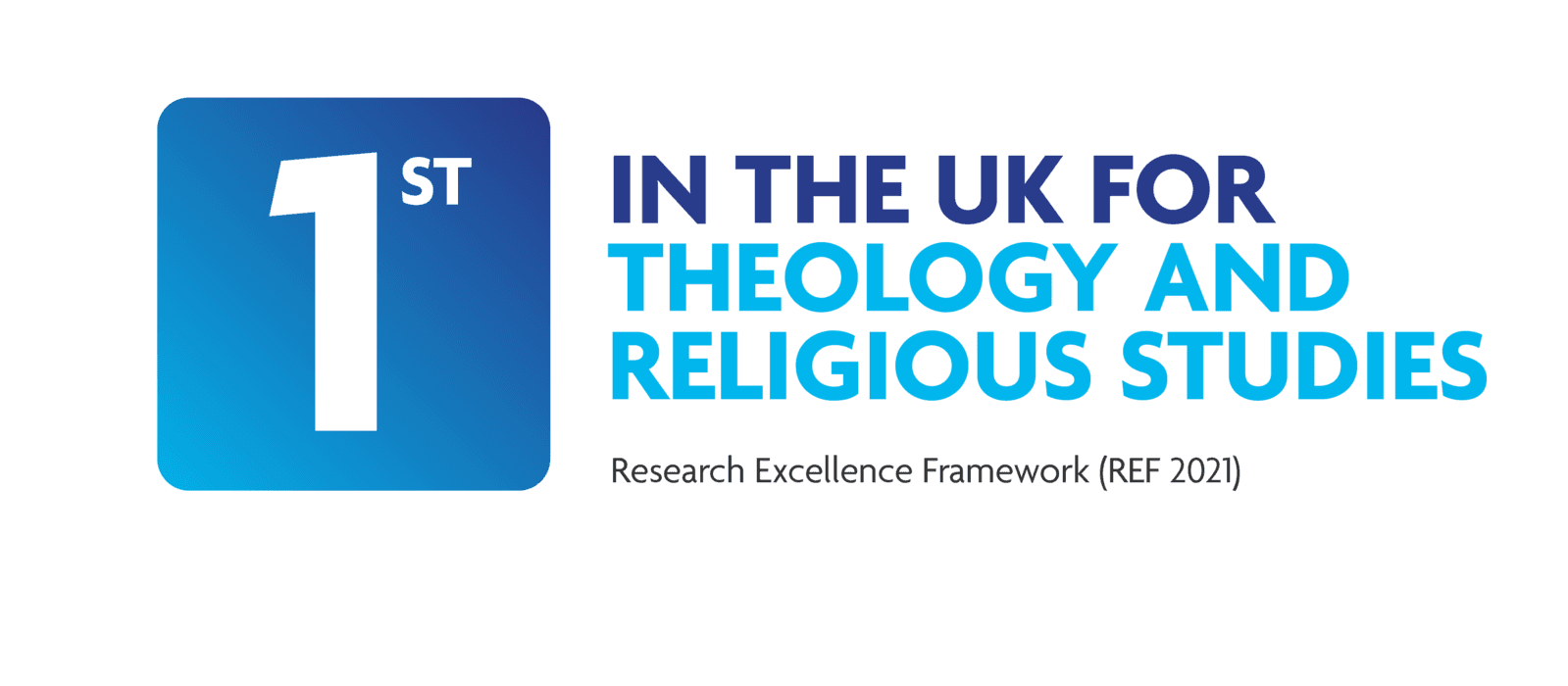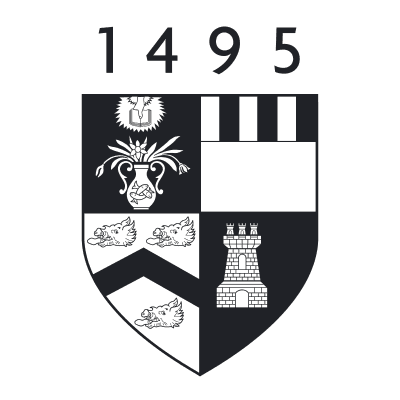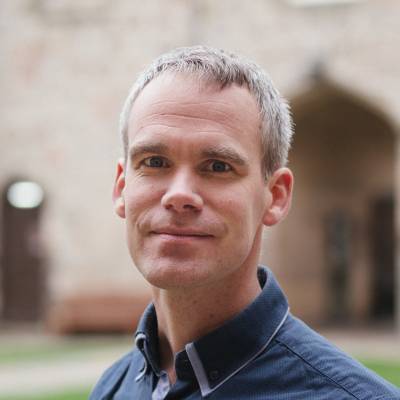Join an online Masters in Theology that explores disability studies from a theological perspective.
The experience of disability opens a fresh space for re-thinking and re-narrating what it means to be human.
Our Masters in Theology and Disability assumes that the form of human difference some choose to name ‘disability’ is a key to new transformative ways of looking at humanity and the nature of the good life.
MTh Theology and Disability draws on expertise from:
Join us online to study at your own pace with highly experienced Disability Theology scholars, and students from around the world.
Flexible study options
- Study for the MTh or exit early with a Postgraduate Certificate or Diploma.
- Set your own study hours with this flexible online degree that’s designed to fit around work and life commitments.
Who can join this online Masters in Theology?
This distance-learning Theology degree is aimed at anyone interested in approaching questions of disability and what it means to be human from a theological perspective.
While the dominant religious perspective is Christian, students of all faiths and none are welcome.
It’s ideal CPD (Continuous Professional Development) for leaders of religious communities, and professionals working in faith communities and organisations.
It’s also excellent preparation for pursuing PhD studies in Disability Theology.

Outstanding Theology research
We’re rated 1st in the UK for the quality of our research in Theology in the latest Research Excellence Framework (REF 2021).
By the end of this degree, you’ll be able to...
-
Reflect theologically on core questions and issues in Disability Theology, such as what it means to be human, and a theological view of healing.
-
Describe and evaluate core ideas of key historical texts that have shaped the context in which Disability Theology is undertaken.
-
Explain and justify your own position regarding influential historical texts, scholars, and developmental trajectories in Disability Theology.
-
Discuss a range of hermeneutical models that bear on the interpretation of the Bible in relation to disability.
-
Analyse how the Bible functions within particular church settings, and how this affects attitudes towards disability and difference.
-
Apply a model of theological reflection to practical experience.
Choose the University of Aberdeen for your online Theology degree

Over 525 years of excellence
Join a university founded in 1495, where Divinity has been taught for more than five centuries.

2nd in Scotland for Theology
We’re rated 2nd in Scotland and 5th in the UK for Theology by the Complete University Guide 2026.

26th in the world for Theology
We’re rated 26th in the world for Theology, Divinity and Religious Studies (QS World University Rankings 2025).
What you’ll study
You can choose to study for a:
- Masters (180 credits)
- Postgraduate Diploma (120 credits), or
- Postgraduate Certificate (60 credits).
How you’ll study
Online learning
This distance-learning Masters in Theology and Disability is delivered flexibly, 100% online.
You can learn with us anywhere, no student visa required, and manage your study hours to suit you.
Your teaching
Teaching is delivered through MyAberdeen, our online Virtual Learning Environment (VLE). It holds all the materials, tools and support you’ll need in your studies. Take a look around MyAberdeen.
You can access your learning materials on computer, smartphone and laptop, 24 hours a day. You’ll find a range of resources at your fingertips, including:
- videos and video lectures
- live online tutorials
- podcasts
- discussion boards with your tutors and peers
- online access to our award-winning Sir Duncan Rice Library.
Live online tutorials
There are six live online tutorials for each of the 30-credit courses that make up this degree. Attendance is compulsory for these sessions, as they’re an important part of your learning.
Tutorial times will be organised flexibly at the start of each course. Your coordinator will consider everyone’s circumstances and time zones before setting up times that best suit the class.
Your tutors
You’ll learn from leading experts in Theology and Disability, based in our School of Divinity, History, Philosophy and Art History (DHPA).

Professor Brian Brock
Brian Brock is Professor of Moral and Practical Theology at the University of Aberdeen. He has written a wide range of scholarly essays on themes related to disability. He is a Managing Editor of the Journal of Disability and Religion.
View Brian’s profile
Dr Emma Percy
Emma is a Senior Lecturer in Feminist Theology and Ministry Studies at the University of Aberdeen. Her research interests include the theology of the female reproductive body, and the virtue of fortitude and spiritual resilience.
View Emma’s profile
Professor John Swinton
John is Professor in Practical Theology and Pastoral Care, and Chair in Divinity and Religious Studies at the University of Aberdeen. He has published widely within the area of mental health, dementia, disability theology, spirituality and healthcare, qualitative research and pastoral care.
View John’s profile
Dr Léon van Ommen
Léon is a Senior Lecturer in Practical Theology at the University of Aberdeen. His research centres on liturgy and autism. Much of his work focuses on the pastoral aspects of liturgy and church in general. Léon is co-director of the Centre for Autism and Theology.
View Léon’s profileThis degree is assessed entirely online via:
- essays
- book reviews
- discussion boards
- practical assignments
- creative assessment, eg, poster presentations and creative writing.
Live online tutorials
Each 30-credit course in this degree features six online tutorials.
You’ll be required to attend these tutorials at their scheduled times.
Tutorial times will be organised flexibly at the start of each course. Your coordinator will consider everyone’s circumstances and time zones before setting up tutorial times.
Study hours
If you plan to study part-time, we recommend you take no more than one 30-credit course per term.
30 credits
- Around 300 hours of study and assessment time to complete.
- You’ll study 15 – 20 hours per week per term, plus more at assessment times.
This is an indicative guide to the time required for a typical student at this level to achieve the learning outcomes. This includes time for independent study, as well as teaching and assessments.
You can largely set your own study hours each week to cover the materials. MyAberdeen is available 24/7, so you can log in and study when it suits you.
Activities at fixed times
There will be some activities scheduled at a fixed time, such as your live online tutorials and assessments with deadlines. But otherwise, you can access and work through each course at your convenience.
Our first-class support structure will ensure that you aren’t alone in your studies. You’ll have contact with your tutors via MyAberdeen and email. You can use social media and discussion boards to chat with your fellow students too.
We provide a wide range of services to support you in your studies and beyond:
- Careers and Employability Service
- Disability support
- IT support
- Library support
- Student Support Service – help with finances, wellbeing and non-academic issues
- Student Learning Service – study support, with advice sessions available
- Aberdeen University Students’ Association (AUSA) – run by students for students
- Toolkit – clever apps and free training that can make your study life easier
Wherever you are in the world, you’ll feel part of our very special Aberdeen learning community.
When you study with us, you can expect a first-class support structure so that you’re never alone in your studies.
But learning online does mean you have to motivate yourself and manage your own time.
Your most important commitment will be time – the time to work through, reflect on and understand your teaching materials.
Before you start a course that involves a high degree of independent study, we recommend looking at the time you will be able to devote to your studies each week:
- Be realistic
- Create a weekly schedule as a guide
If you have any questions about studying online, get in touch with our friendly team. We’re here to help.
We’re a member of the Access scheme run by the Society of College, National and University Libraries (SCONUL).
Access study spaces, books and journals in your area
The SCONUL Access scheme allows you, as a University of Aberdeen student, to access books and resources at university libraries across the UK and Ireland, or visit them for a quiet place to study.
You’ll be able to use study spaces, books and journals at over 150 university libraries which belong to the scheme.
Your support team
Our friendly team are here to answer any queries you have before, during and after your studies.

Dr Emma Percy
Emma is the degree coordinator. She’ll be on hand to answer any questions about degree content before you start and to help you throughout your studies.

Kate Smith
Kate is part of the School’s support team. She’ll be there throughout your studies to answer any of your non-academic queries.

Get in touch
The online education team is here to answer any questions you have right now about this qualification, or about studying online.
Ask us a questionWhere this will take you
Careers
This Masters in Theology and Disability will enhance your practice, leadership, and understanding.
The qualification is ideal for those looking to progress within careers:
- in faith communities and organisations, including ministers, priests, and volunteers in churches or faith-based organisations
- as disability advisors, and
- in organisations that work with people with disabilities.
PhD preparation
This MTh is also excellent preparation for those looking to pursue further PhD studies in the area of Disability Theology.
What our students say
Hear from Jonathan, an online student who graduated with us in summer 2025.

Lifelong career support
Our career support doesn’t stop when you graduate.
You have access to our free careers service while you study, and beyond.
- 1:1 appointments
- CV checks
- Interview prep
- Job opportunities
Fees and funding
Tuition fees typically increase each year. A 3% fee rise has been confirmed for academic years 2026/27, 2027/28 and 2028/29.
Our indicative costs include a 3% fee rise each year.
Pay as you go
This is a pay-as-you-go qualification.
You do not have to pay the full tuition fee upfront.
You can spread the cost and pay as you go, term by term.
How it works
- You decide how many credits to study for each term.
- At the start of term, you pay only for the credits you’re taking that term.
- This gives you control over your costs and workload for each term of your qualification.

Your personalised cost breakdown
Use the degree scheduler to plan your studies and see your cost breakdown, term by term.
Learning resources
Access to all the books and resources you need are included in your tuition fee. They’ll be made available to you online and you do not have to buy your own copies.
Printing
You may wish to set aside a small budget for printing, depending on how you like to work.
There are several ways you may be able to get help funding your studies:
- Employer sponsorship – we accept full and partial fee payments from sponsors
- Student loans
- Scholarships – search our funding database for scholarships
Find out more about funding options.
Student card
All our students are entitled to a University of Aberdeen student card. This gives you access to a range of student discounts around the city and online.
20% Alumni discount
You’re entitled to 20% off our postgraduate taught degrees and short courses if you have a degree from the University of Aberdeen. View Alumni discount details.
How discounts work
Discounts are applied during your application process. You can only use one discount per application.
Entry requirements
MTh, PgDip, PgCert
- 2:2 UK honours degree in a relevant discipline, or
- equivalent qualifications.
You’re also welcome to apply if you have:
- other relevant qualifications, and
- professional experience with supportive references.
Entry requirements
We welcome students from all over the world.
See the minimum entry requirements above. If you do not have qualifications from the UK, check equivalent qualifications from your country.
Visa requirements
You do not need a student visa to study online with us.
English language requirements
Teaching is delivered in English.
If English is not your first language, use our English requirements checklist to see if you need to provide evidence of your English language skills when you apply.
English language tests and scores
If you do need to provide English language test scores, these are the tests and minimum scores we accept.
These are our Postgraduate Higher requirements.
IELTS Academic, IELTS UKVI Academic, or IELTS Online (not IELTS Indicator or IELTS General Training)
- 6.5 overall
- 5.5 for listening and speaking
- 6.0 for reading and writing
TOEFL iBT or TOEFL iBT Home Edition
- 90 overall
- 17 for listening
- 21 for reading
- 20 for speaking
- 21 for writing
- TOEFL DI code is 0818
Cambridge English: B2 First, C1 Advanced, or C2 Proficiency
- 176 overall
- 162 for listening and speaking
- 169 for reading and writing
LanguageCert Academic / LanguageCert Academic SELT
- 70 overall
- 60 for listening and speaking
- 65 for reading and writing
Oxford ELLT Digital – English Language Level Test Online
- 7.0 overall
- 5.0 for listening and speaking
- 6.0 for reading and writing
PTE Academic (online test not accepted)
- 62 overall
- 59 for listening, reading, speaking and writing
Skills for English: SELT
- B2 pass with merit
Duolingo – tests taken from 1 July 2024 onward
- 120 overall
- 95 for listening and speaking
- 105 for reading and writing
University of Aberdeen English Pre-sessional Programme (PSE)
- Pass
- Valid for one year. Refresher can be offered if out of date
Pre-sessional academic English preparation programmes undertaken at other UK universities
- Pass at an equivalent of 6.5 (C1)
- B2 in all four skills
- Certification must be within one year prior to the start of your course
For more information about language qualifications see our English Language Requirements page.
You apply through our online Applicant Portal. It allows you to upload relevant qualifications and documents.
There is no application fee for our online degrees.
What you need to apply for this degree
- Degree transcript
- Personal statement
- Degree certificate
Apply now
Start with our step-by-step guide. It explains degree transcripts, what to write in your personal statement and how to use our Applicant Portal.
You can apply to start in either September or January.
Apply as early as you can. This is so we have time to review your application and get a decision to you. We also want to ensure you have time to enrol before teaching starts.
September 2026 intake
For our September 2026 intake, the application deadline is 6 September 2026.
You will need to accept your offer and provide any outstanding documents to meet the conditions of your offer by 13 September 2026.
Teaching starts on 21 September 2026.
January 2027 intake
Teaching starts on 25 January 2027.
Application deadlines will be announced in due course.
You will need access to:
A computer (PC, laptop or Mac) with an up-to-date operating system
Most teaching materials are smartphone- and tablet-friendly. But we recommend a proper laptop or desktop for completing assignments comfortably.
Reliable internet access
We recommend:
- a wired connection
- a minimum download speed of 2 Mbps so you can take part fully in live sessions.
Speakers or headphones
- We recommend a headset with built-in microphone and earphones if you’re likely to study in an environment with background noise.
- A webcam is optional, but you may like to use one for some interactive sessions.
Software
We’ll give you access to Office365 applications. This means you can use online versions of Microsoft Word, Excel, PowerPoint and OneDrive and install these programs on up to five personal devices.
If your course requires specialist software, we’ll provide you with access to this and a licence that lasts throughout your studies.
See our detailed IT requirements for more information.
Try our degree scheduler

Choose your courses
See all the courses that are part of this degree and choose what you want to study.

Manage your study schedule
Control the pace and cost of your degree. Decide how much you want to study each term.

Save to your wishlist
Save your schedule to your wishlist so you can view and edit anytime.
Master of Theology
180 credits
£11,180
This indicative cost is based on 180 credits of study over three years, starting in September 2026.
Postgraduate Diploma
120 credits
£7,340
This indicative cost is based on 120 credits of study over two years, starting in September 2026.
Postgraduate Certificate
60 credits
£3,620
This indicative cost is based on 30 credits of study per term, starting in September 2026.
Apply for this programme
- Start month
- September or January
- Indicative cost
- £11,180
This indicative cost is based on 180 credits of study over three years, starting in September 2026.
Apply via our Applicant Portal


